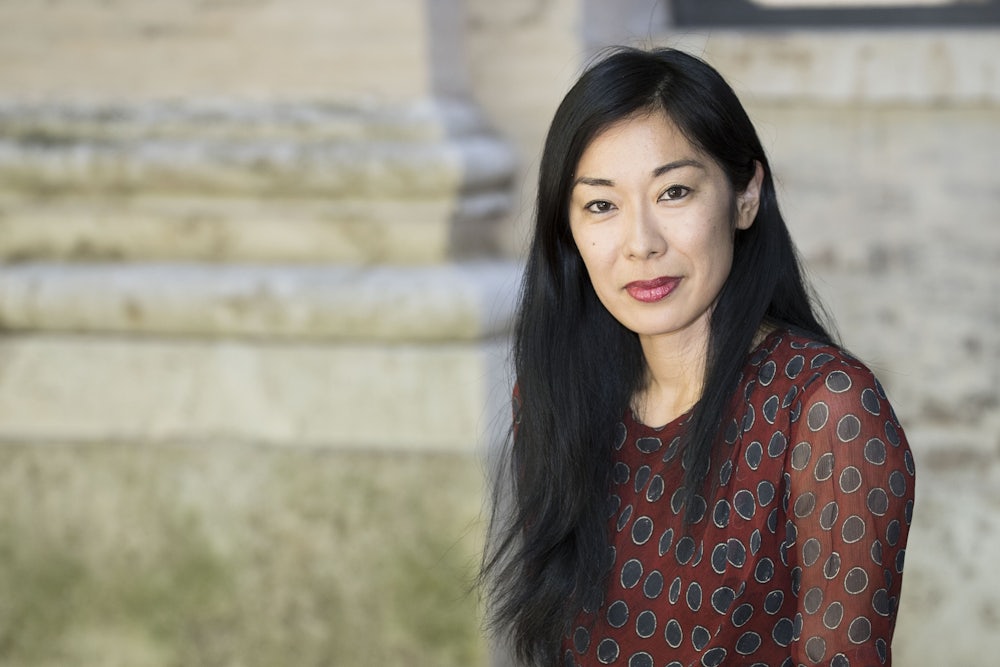Katie Kitamura’s 2017 novel A Separation tells the story of a woman, a literary translator living in London, who flies off to Greece to track down her estranged husband and ask him for a divorce. For a translator like Kitamura’s unnamed narrator, her husband’s infidelity constitutes both an unforgivable transgression (“Translators are always worried about being faithful to the original”) and the most aesthetic of moral failings. Fidelity is, she reflects, “an impossible task because there are multiple and often contradictory ways of being faithful.” Her husband is a writer working on a book about mourning rituals; she believes he has absconded to Greece to study the tradition of weepers, village women who sing funeral dirges on behalf of the bereaved. She visits the weepers, and takes careful note of their techniques. They tell her how to churn enough sadness within you so that you can later render the pain of others accurately, faithfully.

With Intimacies, Kitamura gives the question of how to voice someone else’s suffering a political urgency of the highest order. The novel presents a new multilingual and unnamed heroine who works as an interpreter at the International Criminal Court in The Hague. A reader who has never interpreted professionally before might find the passages about the “great chasms lying beneath words” glamorous and intriguing, but anyone who has had the pleasure will find themselves terrified by the stakes that Kitamura sets up here. Any shift in terminology between interpreters, the narrator explains, could cause the prosecution’s case to fall apart: “a reliable witness could appear unreliable.”
Despite being good at her work, the narrator is not convinced that her work does much good—she acknowledges the Court’s disproportionate prosecution of African leaders and warlords and the blind eye it casts on the crimes of the West. One of them, sensing her judgment, balks. “Your country has committed terrible crimes and atrocities. Under different circumstances your State Department would be on trial here, not me.” (It is worth noting that former President Barack Obama included Intimacies on his 2021 Summer Reading List.) Ultimately, the narrator is there because she is emotionally adrift following the death of her father and needs a place that feels as homeless as she does, unmoored from any one place or culture. She was born in Singapore, but has no memory of it, is fluent in Japanese but spent her childhood in Paris. Her supervisor later tells her: “many at the Court have similar family histories, a certain rootlessness seems almost to be a precondition for the work.”
Her existence in the Hague feels unstable and constantly in motion. Everything in her life is borrowed; even her Dutch boyfriend Adriaan is married to another woman. She spends much of the novel living in apartment that is not her own. Her friends are largely people she has just met; she barely trusts her closest confidant in the city, an art curator named Jana, alone with Adriaan. She takes taxis, a different driver every time lest one of them gets any ideas. It is against this backdrop of detachment that Kitamura offers up this uncertain treatise on intimacy. To be intimate is presented as a deep human need, but not an unqualified good. As an interpreter, the narrator is frequently subjected to unwanted intimacies, connections that must be forged to do the job and yet feel forced on her. Perhaps because of this, she keeps Adriaan at a safe distance, but when he leaves for Portugal to settle things, one way or another, with his wife, that same distance becomes unbearable.
The novel is set in the lead-up to Brexit, and is filled with marriages and international organizations beginning to fray at the edges. Everyone is disoriented, in some self-created liminal space between together and apart. An interpreter, the narrator finds herself as the medium for all of these figures, uncertain if her job is to narrow these divides or to further the illusion that they do not exist. Ultimately, what is on trial in Intimacies is our tendency, as individuals and as political entities, to come together only to push each another away.
In the context of the Court, big assignments that might advance an interpreter’s career come with a sense of the foreboding, and rightly so. When the narrator is pulled aside for a special assignment—serving as interpreter between a former head of state charged with ethnic cleansing and his legal team, what unfolds is a series of disquieting moments of intimacy. Over time, she begins seeing the trial from his perspective and she becomes disgusted, not by him, but by herself—or rather by how well she is doing her job. It was, she says, “like being placed inside a body I had no desire to occupy. I was disgusted, to find myself so permeable.” During a meeting between him and his lawyers, he gestures towards a word written down on her legal pad: perpetrator. He “winced, as if embarrassed,” she says, until it is revealed that he is less shamed by his actions than by how they sound in translation. “It looks much worse than it really is,” he assures her. “The language has no nuance.” The experience convinces her that her role is actually quite different from how she first imagined it. If once she thought it was about bridging divides (“to make the space between languages as small as possible,” she says at first), she now wants it to be a form of enclosure, a wall: “my job,” she corrects herself, “was to ensure that there would be no escape route between languages.”
This negotiation becomes a pattern in the novel; to be close, to be intimate, is not always to be in communion. The Court brings the world together, but to punish, and selectively so. Kitamura is also an accomplished art critic and she sets a long scene inside the Mauritshuis, the Dutch national art gallery in the Hague, where Jana works. Though there for an exhibition called “Slow Food” on still-life paintings of various fruit, she wanders into the permanent collection and becomes entranced by the portraits. “The artifice of the poses was evident, but that did not detract from the intimacy of paintings,” she observes. This intimacy, she feels convinced, derives from the fact that the subjects must have been looking directly at the painter themselves. “The idea was almost impossibly personal,” she reflects, “and I realized the notion of such a sustained human gaze was far outside the realm of contemporary experience.” That dream of a kind of a pure, unmediated connection becomes swiftly undone, however, when the narrator is reminded of how violently disconnected these paintings in fact are from the system of violence and plunder they emerged from. Eline, an acquaintance of Jana’s there for the exhibit, reminds her how quickly the Dutch Empire was growing at the time. “The relentless domesticity of these quiet interiors takes on a different meaning seen in that light,” she remarks. “It means something, to face inward, to turn your back on the storm brewing outside.” In other words, to gaze longingly into the eyes of the artist means, by default, to look away from everyone else.
As the narrator tries to parse the meanings of intimacy in the realms of international politics and European colonialism, she also does so in her personal life, and indeed, one of the most fascinating qualities of the novel is Kitamura’s insistence that everything—from the war on terror to gentrification in the Hague to extramarital affairs—is somehow connected. As the trial against the head of state threatens to unravel, rumblings start to swell about the fate of the Court and international institutions like it, indeed, even the European project. At the same time, her relationship with Adriaan begins to feel like a ghost of itself. While in Portugal, he stops responding to her text messages. She has the key to his apartment and yet he is not there, only the idea of him and what they used to share there. First Adriaan, then perhaps Europe—everyone is giving up on togetherness at the same time. And what of it?
In this way, Kitamura is still writing about what it means to separate, and comes close here at times to suggesting that, given the destructiveness of human nature, there might be greater harm in proximity than distance. Yet, our narrator knows, as perhaps only an interpreter can, just how impossible it is to break things apart, to regard people and words as islands. “Interpretation can be profoundly disorienting,” she explains, “you can be so caught up in the minutiae of the act, in trying to maintain utmost fidelity to the words being spoken by the subject and then by yourself, that you do not necessarily apprehend the sense of the sentences themselves.” In other words, we need context to make meaning, in language and in life. It is only when we see the whole, closely knitted together, that we know we are a part of something.








